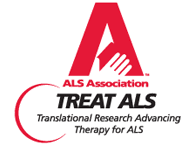News Release: Research, School of Medicine
Mar. 11, 2009
New Clinical Trial for ALS Patients Opens for Enrollment

A clinical trial for patients with rapidly progressive forms of familial amyotrophic lateral sclerosis (ALS) has begun enrollment at Emory University. The study, using the drug arimoclomol, will specifically target ALS caused by mutations in the superoxide dismutase (SOD1) gene.
The trial is being supported by The ALS Association as part of the Translational Research Advancing Therapies for ALS (TREAT ALS) program.
ALS, often referred to as "Lou Gehrig's Disease," is a progressive neurodegenerative disease that affects nerve cells in the brain and the spinal cord. Arimoclomol acts by up-regulating heat shock proteins, which help other proteins fold properly in nerve cells. ALS has been linked to the presence of possibly toxic unfolded proteins in nerve cells.
Previous research has shown arimoclomol is effective in the SOD1 mouse model of ALS even when initiated after the onset of symptoms, and was found to be safe and well tolerated in a previous phase II clinical trial that included patients with sporadic ALS.
"We are very pleased to be able to test arimoclomol in patients with mutations in the SOD1 gene," says Michael Benatar MBChB, MS, DPhil, associate professor of neurology and epidemiology, Emory University School of Medicine.
"With this mutation the diagnosis of ALS can be made with confidence based on less prominent clinical features, allowing initiation of treatment at an earlier stage in the disease process," adds Benatar, principal investigator for the study.
Lucie Bruijn, PhD, senior vice president of research and development for The ALS Association, says the TREAT ALS initiative is designed to accelerate the clinical trials process with the objective of rapidly bringing new therapies to people with the disease.
"This is an exciting opportunity to learn more about the potential benefits that arimoclomol may have for treating people who have the familial form of this disease," Bruijn says.
Previously, medications that have been found to be effective in the mouse model of ALS have not shown benefit when brought to human clinical trials. Benatar and dual-principal investigator, Merit Cudkowicz, MD, Harvard Medical School, believe that the SOD1 mouse model of ALS most closely resembles SOD1-positive familial ALS in humans and hence this is the population most likely to benefit from arimoclomol.
According to Benatar, more than 90 percent of ALS cases are considered sporadic with a minority having a clear genetic cause. SOD1 mutations represent roughly 20 percent of familial forms of ALS.
The target population for this double-blind, placebo-controlled, phase II/III clinical trial is patients with rapidly progressive ALS due to select mutations in the SOD1 gene. The trial aims initially to recruit 30 ALS patients in order to evaluate drug safety and tolerability. Thereafter, approximately 50 more patients will be recruited. All study participants will be treated for a total of 12 months.
The ALS Association’s TREAT ALS initiative is a multi-faceted program that supports the development of compounds for FDA-approved clinical trials. It was the first program of its kind in ALS to help bridge the gap between laboratory research discoveries and treatment for ALS.
For more information about the ALS clinical trial at Emory, please send an email to fals@emory.edu. Additional information is also available at the clinicaltrials.gov website. http://clinicaltrials.gov/ct2/show/NCT00706147?term=Benatar&rank=1
For more information about The ALS Association and its global research program, go to www.alsa.org.
###
The Robert W. Woodruff Health Sciences Center of Emory University is an academic health science and service center focused on missions of teaching, research, health care and public service. Its components include schools of medicine, nursing, and public health; Yerkes National Primate Research Center; the Emory Winship Cancer Institute; and Emory Healthcare, the largest, most comprehensive health system in Georgia. The Woodruff Health Sciences Center has a $2.3 billion budget, 17,000 employees, 2,300 full-time and 1,900 affiliated faculty, 4,300 students and trainees, and a $4.9 billion economic impact on metro Atlanta.
Learn more about Emory’s health sciences:
Blog: http://emoryhealthblog.com
Twitter: @emoryhealthsci
Web: http://emoryhealthsciences.org
